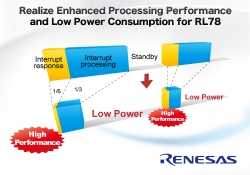Renesas Electronics Improves Performance and Power for Home Appliances, Industrial and Automotive Systems with Expanded Microcontroller Development Environment
TOKYO, Japan, — Renesas Electronics Corporation (TSE: 6723), a premier supplier of advanced semiconductor solutions, today announced the availability of the new CC-RL C compiler (Note 1) for the RL78 Family of 16-bit microcontrollers (MCUs). The new CC-RL C compiler takes advantage of the trusted RL78 MCU Group’s low-power innovations and achieves increased processing performance to respond to industry needs for high performance and low power consumption in home appliances, industrial, and automotive systems.
Next-generation home appliances, industrial, and automotive systems require MCUs that deliver faster processing speeds to support the increasing diversity and performance of functions provided by these types of motor-based systems. The new CC-RL C compiler improves performance by three times (Note 2) compared to the existing Renesas compiler. Additionally, the interrupt response performance time is improved by six times (Note 2), which ultimately provides customers significantly higher performance in application systems. The CC-RL C compiler also enables longer operating times for battery-operated home appliances and industrial equipment such as healthcare equipment and fire detectors, offering a combination of high performance and reduced power consumption for RL78 MCU-based design.
The new compiler is ideal for users working with the e2 studio (eclipse embedded studio) integrated development environment (IDE), which is being adopted on a global scale. The CC-RL C compiler will be available in both standard and professional versions, with MISRA-C functions in the professional edition.
Renesas Electronics continues to strengthen its robust MCU ecosystem, providing innovative MCU solutions, including IDE tools like the new the new CC-RL C compiler, to increase efficiency in customer development activities while improving performance and reliability to add higher value in user application systems.
Key Features of the New C compiler CC-RL:
-
(1) Three-times improved MCU processing performance by employing the latest optimization technology
The most significant feature of the CC-RL C compiler is the improvement in MCU processing performance it achieves. The performance of programs coded in standard ANSI C (Note 3), is improved by three times as compared to the existing Renesas compiler, without any changes to the code itself. Furthermore, the interrupt response performance, which is critical at the system level, is improved by six times. These performance improvements can contribute significantly to higher performance in application systems. This allows the users to make effective use of existing software assets.
-
(2) Reduced MCU power consumption and 10 percent (Note 2) smaller code size
Most systems alternate between running in the normal state and waiting in the standby state, where almost no power is consumed. Due to the speed improvements described above, the time spent in the normal state is reduced, and the time spent in the standby state increases by that amount. This allows the MCU’s power consumption to be reduced (refer to above diagram). Furthermore, the CC-RL C compiler generates code that is 10 percent smaller than that generated by the earlier C compiler. This allows even more functions to be included in systems and thus can contribute to increased added value in application systems.
-
(3) MISRA-C (Note 4) guideline checking functions
The CC-RL C compiler includes functions for checking items in the MISRA-C:2004 guidelines. Since these checks are performed automatically at compile time, missed syntax checks and incorrect file specifications are prevented. Thus these functions can correct all coding that violates the guidelines. The CC-RL C compiler is available in a standard version and a professional version; the MISRA-C checking functions are only included in the professional version.
Availability
The CC-RL C compiler is scheduled to be available from April 20, 2015.
(Availability is subject to change without notice.)
- (Note 1) Compiler:
A program that translates programs written in higher-level programming languages such as C into machine code that the MCU CPU can understand. - (Note 2)
When compared to earlier Renesas compiler for the RL78 MCUs. These values are the result of evaluations based on application programs in Renesas’ possession. - (Note 3) ANSI-C:
American National Standard for Information Processing – Programming Language – C. This standard defines the C programming language, which is also referred to as “Standard C”. - (Note 4) MISRA-C:
A set of guidelines created by the Motor Industry Software Reliability Association for programs written in the C programming language for use in automotive applications.
(Remarks)
All other registered trademarks or trademarks are the property of their respective owners.

